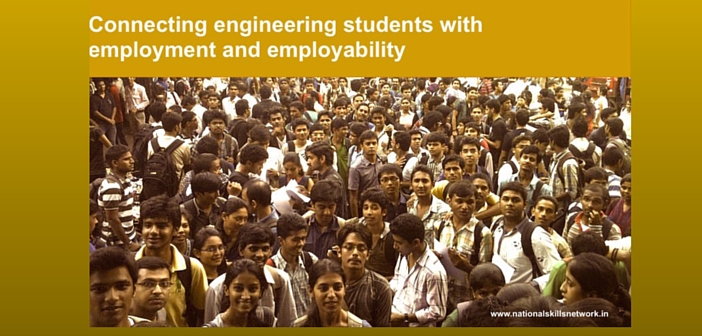Guest author: Chithra Rema
Engineering skill development is one of the high priority needs for our country. Currently, the engineering graduates have limited opportunities for jobs in India. There are opportunities available both in public and private sector. In the public sector, the candidate has to follow the traditional recruitment process, which is time consuming .The opportunities are very limited in this sector. The chances of getting a job are limited due to the high volume of applicants. In most cases it is the candidate who has to search and find out job opportunities.

In private sector, comparatively, higher numbers of opportunities are created each year. There are two recruitment approaches adopted by the organizations; on campus and off-campus recruitment. The larger organizations mostly rely on campus hiring in which they find their talent from the campus. On the other hand in off-campus mode the candidate has to wait and apply for the relevant openings. In small and medium scale organizations, the recruitment process is mostly through off campus mode. They mostly follow the traditional recruitment cycle. Most of the small organizations follow employee referral programs as the best possible solution. The following figures look startling and need our immediate attention and action:
- Though 18.33% of the engineers are employable, 18.09% actually get a job (Source: 3rd edition of National Employability Report, Engineering Graduates – 2014, released by a private employability solutions company)
- 75% of the engineering graduates are not employable (NASSCOM –Mckinsey 2005), 67% of the employers are only ‘somewhat satisfied with the performance of the newly hired employees (World bank 2011)
- Out of one million graduates passing out of engineering colleges every year, only 10% found a job in engineering and allied industries
- Only this 10% will get formal training. The 90% of the population is still lacking training. Of that only a negligible percentage will put an effort to skill themselves
The above facts offer a glimpse into the seriousness of the issues for the industry as well as the society. Here are five action points that can come a long way in ensuring sustained employability of engineers:
Improving technical skills by keeping updated with latest developments in the discipline
Due to the advancement of technology, the availability of online training programs and MOOCs are at the finger tips of graduates. Some of the learning resources like www.nptel.ac.in provide free study materials and certification opportunity in technical skills.
Awareness about employability skills, especially soft skills that are needed to perform right from their first job onwards
It is essential to include the soft-skills and behavioural skills training from the initial years of engineering course. The use of technology in training students is essential as this will encourage them to find out online free resources for self learning. In the case of soft skill and behavioural skill development there are ample free resources available for students. Guiding them to find out the suitable resource is the best possible way for reducing skill gaps.
Awareness about the industry and the job market requirements
To cope up with the industry demands, students mostly rely on the skill development sessions provided by their educational institutions. Some of them take initiative to enhance their skills through paid training sessions. Realizing the opportunities in industry and its skill requirements, it is students have to take initiative in skill development.
Closer interaction between the industry and the academia
Lack of industry- academia interaction is one of the major reasons for skill gap in India. The mystery over industry needs still remains and this is affecting in the curriculum development. The industry and academia can work in many ways. The academia can support the research and development needs of industry with the support of graduate students. By this both the parties will get benefited as the students get opportunity to work in live projects and the organization can effectively reduce its operational cost. The apprenticeship is a good example. This will reduce the cost in training. The industry can identify the high potential talent while at work. This will reduce the cost of recruitment and training process to a large extent. It is beneficial for the students as they are getting work experience. The regular industry- academia connect will increase the awareness of students about industry demands and work culture.
Support for innovation, entrepreneurship and self-employment
By 2020 India will be the youngest start –up nation in the world. The students should be encouraged to participate in innovation of technology and to start their own ventures. The students have to encourage to participate and take research as a career and to contribute to the development of this country.
I’m sure there are other ways we can identify the gaps in their skilling system for engineering disciplines. Do let me know what these points are and how you had addressed them.
About the author
Chithra is a final year Ph.D scholar in Management (International Business) with specialization in International HRM at Pondicherry University. She has 6 years work experience in Training and development. As a Faculty member at Life skills Training group in Tata Consultancy Services (TCS) Global Training Centre Trivandrum, she had trained more than 3000 entry level engineering graduates during her tenure at TCS. She is the first Indian Scholar to receive the most prestigious Global HRD Awards (2014) from International Federation of Training and Development Organizations (IFTDO) in 2014 for her excellence in Research in Training and Development. She has published articles in national and international journals and has presented her papers in various management forums. She can be reached at chithrarema@gmail.com














